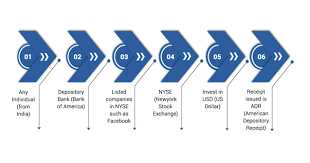What is an International Depository Receipt?
An International Depository Receipt (IDR) is a financial instrument that represents ownership of shares in a foreign company. It is issued by a depository bank in a country outside the home country of the company. IDRs are commonly used by companies to raise capital in international markets and allow investors to trade shares of foreign companies without having to deal with the complexities of foreign exchanges.
When a company decides to issue IDRs, it appoints a depository bank, which holds the company’s shares and issues the IDRs to investors. Each IDR represents a specific number of shares in the company, and the value of the IDR is determined by the performance of the underlying shares.
One of the main benefits of IDRs is that they provide investors with access to international markets and allow them to diversify their portfolios by investing in foreign companies. IDRs also provide companies with a way to raise capital from a global investor base, which can help them expand their operations and finance new projects.
Overall, IDRs play a crucial role in facilitating international investment and promoting global capital flows. They provide a convenient and efficient way for investors to access foreign markets and for companies to raise capital internationally.
Definition and Explanation
An International Depository Receipt (IDR) is a financial instrument that represents ownership in a foreign company’s shares. It is issued by a foreign depository bank in a country different from where the company is based. IDRs are used to facilitate cross-border investment and allow investors to trade shares of foreign companies without having to deal with the complexities of investing directly in foreign markets.
How do International Depository Receipts work?
When a foreign company decides to issue IDRs, it appoints a depository bank in a foreign country to handle the issuance and trading of the receipts. The depository bank purchases a block of shares from the foreign company and deposits them with a custodian bank in the foreign country. The custodian bank then issues the IDRs to investors.
Each IDR represents a certain number of underlying shares of the foreign company. The value of the IDR is determined by the performance of the underlying shares in the foreign market. Investors can buy and sell IDRs on the local exchange in the foreign country, just like they would trade shares of a domestic company.
Benefits of International Depository Receipts
International Depository Receipts offer several benefits to investors:
- Diversification: IDRs allow investors to diversify their portfolios by investing in foreign companies without the need to directly access foreign markets. This helps spread the investment risk across different countries and industries.
- Liquidity: IDRs are traded on local exchanges, providing investors with liquidity and the ability to easily buy or sell their holdings.
- Convenience: Investing in IDRs eliminates the need for investors to navigate the complexities of investing directly in foreign markets, such as dealing with foreign currency, legal, and regulatory requirements.
- Access to Global Opportunities: IDRs provide investors with access to investment opportunities in foreign markets that may have higher growth potential or offer unique products or services.
Overall, International Depository Receipts play a crucial role in facilitating cross-border investment and allowing investors to participate in the global economy with ease and convenience.
Uses and Benefits

International Depository Receipts (IDRs) offer several uses and benefits for both investors and companies.
1. Diversification of Investment Portfolio
One of the main benefits of IDRs is that they allow investors to diversify their investment portfolio. By purchasing IDRs, investors can gain exposure to foreign companies and markets without the need to directly invest in those markets. This diversification can help to reduce risk and potentially increase returns.
2. Access to International Markets
For companies, IDRs provide a way to access international capital markets and raise funds from global investors. By issuing IDRs, companies can tap into a larger pool of potential investors and increase their visibility in the global market. This can be particularly beneficial for companies in emerging markets that may have limited access to domestic capital markets.
3. Increased Liquidity
Another advantage of IDRs is that they can enhance the liquidity of a company’s shares. By listing IDRs on an international exchange, companies can attract a broader base of investors, which can lead to increased trading volume and liquidity. This can make it easier for investors to buy and sell IDRs, improving market efficiency.
4. Currency Diversification
Investing in IDRs can also provide currency diversification benefits. Since IDRs are typically denominated in a currency different from the investor’s home currency, they can act as a hedge against currency risk. This can help investors mitigate the impact of exchange rate fluctuations and potentially enhance their overall investment returns.

Emily Bibb simplifies finance through bestselling books and articles, bridging complex concepts for everyday understanding. Engaging audiences via social media, she shares insights for financial success. Active in seminars and philanthropy, Bibb aims to create a more financially informed society, driven by her passion for empowering others.
